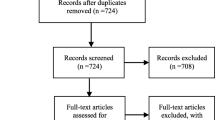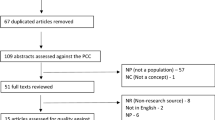Abstract
Many nurses express difficulty in communicating with their patients, especially in oncology settings where there are numerous challenges and high-stake decisions during the course of diagnosis and treatment. Providing specific training in communication skills is one way to enhance the communication between nurses and their patients. We developed and implemented a communication skills training program for nurses, consisting of three teaching modules: responding empathically to patients; discussing death, dying, and end-of-life goals of care; and responding to challenging interactions with families. Training included didactic and experiential small group role plays. This paper presents results on program evaluation, self-efficacy, and behavioral demonstration of learned communication skills. Three hundred forty-two inpatient oncology nurses participated in a 1-day communication skills training program and completed course evaluations, self-reports, and pre- and post-standardized patient assessments. Participants rated the training favorably, and they reported significant gains in self-efficacy in their ability to communicate with patients in various contexts. Participants also demonstrated significant improvement in several empathic skills, as well as in clarifying skill. Our work demonstrates that implementation of a nurse communication skills training program at a major cancer center is feasible and acceptable and has a significant impact on participants’ self-efficacy and uptake of communication skills.

Similar content being viewed by others
References
The Joint Commission. Facts about Patient-Centered Communications. Accessed from: https://www.jointcommission.org/facts_about_patient-centered_communications/, 2015.
Institute of Medicine; Committee on Quality of Health Care in America. (2001). Crossing the quality chasm: a new health system for the twenty-first century. Washington: National Academy Press.
Institute of Medicine. (2011). The future of nursing: leading change, advancing health. Washington: National Academy Press.
McCarthy, B. (2014). Patients’ perceptions of how healthcare providers communicate with them and their families following a diagnosis of colorectal cancer and undergoing chemotherapy treatment. Eur J Oncol Nurs, 18(5), 452–458.
Vorderstrasse, A. A., Hammer, M. J., & Dungan, J. R. (2014). Nursing implications of personalized and precision medicine. Semin Oncol Nurs, 30(2), 130–136.
Jenerette, C. M., & Mayer, D. K. (2016). Patient-provider communication: the rise of patient engagement. Semin Oncol Nurs, 32(2), 134–143.
Donovan-kicken, E., & Caughlin, J. P. (2011). Breast cancer patients’ topic avoidance and psychological distress: the mediating role of coping. J Health Psychol, 16(4), 596–606.
Hagerty, R. G., Butow, P. N., Ellis, P. M., et al. (2005). Communicating with realism and hope: incurable cancer patients’ views on the disclosure of prognosis. J Clin Oncol, 23(6), 1278–1288.
Jin, J., Sklar, G. E., Oh, V. M. S., & Li, S. C. (2008). Factors affecting therapeutic compliance: a review from the patient’s perspective. Ther Clin Risk Manag, 4(1), 269–286.
Kerr, J., Engel, J., Schlesinger-Raab, A., Sauer, H., & Hölzel, D. (2003). Communication, quality of life and age: results of a 5-year prospective study in breast cancer patients. Ann Oncol, 14(3), 421–427.
Rassin, M., Levy, O., Schwartz, T., & Silner, D. (2006). Caregivers’ role in breaking bad news: patients, doctors, and nurses’ points of view. Cancer Nurs, 29(4), 302–308.
Pilsworth, A., Blankley, K., & Faull, C. (2014). Influencing nurses’ communication style through a two day interactive communication skills course. BMJ Support Palliat Care, 4, A36.
Wittenberg-Lyles, E., Goldsmith, J., & Ferrell, B. (2013). Oncology nurse communication barriers to patient-centered care. Clin J Oncol Nurs, 17(2), 152–158.
Traeger, L., Park, E. R., Sporn, N., et al. (2013). Development and evaluation of targeted psychological skills training for oncology nurses in managing stressful patient and family encounters. Oncol Nurs Forum, 40(4), E327–E336.
Weber, O., Sulstarova, B., & Singy, P. (2016). Cross-cultural communication in oncology: challenges and training interests. Oncol Nurs Forum, 43(1), E24–E33.
Jors, K., Seibel, K., Bardenheuer, H., et al. (2016). Education in end-of-life care: what do experienced professionals find important? J Cancer Educ, 31(2), 272–278.
Baer, L., & Weinstein, E. (2013). Improving oncology nurses’ communication skills for difficult conversations. Clin J Oncol Nurs, 17(3), E45–E51.
Canivet, D., Delvaux, N., Gibon, A. S., et al. (2014). Improving communication in cancer pain management nursing: a randomized controlled study assessing the efficacy of a communication skills training program. Support Care Cancer, 22(12), 3311–3320.
Kruijver, I. P., Kerkstra, A., Bensing, J. M., & van de Wiel, H. B. (2001). Communication skills of nurses during interactions with simulated cancer patients. J Adv Nurs, 34(6), 772–779.
Razavi, D., Delvaux, N., Marchal, S., et al. (1993). The effects of a 24-h psychological training program on attitudes, communication skills and occupational stress in oncology: a randomised study. Eur J Cancer, 29A(13), 1858–1863.
van Weert, J. C., Jansen, J., Spreeuwenberg, P. M., et al. (2011). Effects of communication skills training and a question prompt sheet to improve communication with older cancer patients: a randomized controlled trial. Crit Rev Oncol Hematol, 80(1), 145–159.
Moore PM, Rivera Mercado S, Grez Artigues M, Lawrie TA. Communication skills training for healthcare professionals working with people who have cancer. Cochrane Database Syst Rev. 2013;(3):CD003751.
Banerjee, S. C., Manna, R., Coyle, N., et al. (2016). Oncology nurses’ communication challenges with patients and families: a qualitative study. Nurse Educ Pract, 16(1), 193–201.
Pehrson, C., Banerjee, S. C., Manna, R., et al. (2016). Responding empathically to patients: development, implementation, and evaluation of a communication skills training module for oncology nurses. Patient Educ Couns, 99(4), 610–616.
Coyle, N., Manna, R., Shen, M., et al. (2015). Discussing death, dying, and end-of-life goals of care: adaptation and initial evaluation of a communication skills training module for oncology nurses. Clin J Oncol Nurs, 19(6), 697–702.
Zaider, T. I., Banerjee, S. C., Manna, R., et al. (2016). Responding to challenging interactions with families: a training module for inpatient oncology nurses. Fam Syst Health, 34(3), 204–212.
Brown, R. F., & Bylund, C. L. (2008). Communication skills training: describing a new conceptual model. Acad Med, 83(1), 37–44.
Bylund, C. L., Brown, R. F., Bialer, P. A., et al. (2011). Developing and implementing an advanced communication training program in oncology at a comprehensive cancer center. J Cancer Educ, 26(4), 604–611.
Bylund, C. L., Brown, R. F., di Ciccone, B. L., et al. (2008). Training faculty to facilitate communication skills training: development and evaluation of a workshop. Patient Educ Couns, 70(3), 430–436.
Kirkpatrick, D. L. (1967). Evaluation of training. In R. Craig & I. Bittlel (Eds.), Training and development handbook. New York: McGraw Hill.
Hill, L. G., & Betz, D. L. (2005). Revisiting the retrospective pretest. Am J Eval, 26(4), 501–517.
Bylund, C. L., Brown, R., Gueguen, J. A., et al. (2010). The implementation and assessment of a comprehensive communication skills training curriculum for oncologists. Psychooncology, 19(6), 583–593.
Rieger, P. T., & Yarbro, C. H. (2003). Principles of oncology nursing. In D. W. Kufe, R. E. Pollock, R. R. Weichselbaum, et al. (Eds.), Holland-Frei cancer medicine (6th ed.). Hamilton: BC Decker.
Morgan, P. A., de Oliveira, J. S., Alexander, S. C., et al. (2010). Comparing oncologist, nurse, and physician assistant attitudes toward discussions of negative emotions with patients. J Physician Assist Educ, 21(3), 13–17.
Turner, J., Clavarino, A., Yates, P., et al. (2007). Oncology nurses’ perceptions of their supportive care for parents with advanced cancer: challenges and educational needs. Psychooncology, 16(2), 149–157.
Bosse, H. M., Nickel, M., Huwendiek, S., et al. (2015). Cost-effectiveness of peer role play and standardized patients in undergraduate communication training. BMC Med Educ, 15, 183.
Gattellari, M., Butow, P. N., & Tattersall, M. H. (2001). Sharing decisions in cancer care. Soc Sci Med, 52(12), 1865–1878.
Uitterhoeve, R., Bensing, J., Dilven, E., et al. (2009). Nurse-patient communication in cancer care: does responding to patient’s cues predict patient satisfaction with communication. Psychooncology, 18(10), 1060–1068.
Vogel, B. A., Leonhart, R., & Helmes, A. W. (2009). Communication matters: the impact of communication and participation in decision making on breast cancer patients’ depression and quality of life. Patient Educ Couns, 77(3), 391–397.
Emold, C., Schneider, N., Meller, I., & Yagil, Y. (2011). Communication skills, working environment and burnout among oncology nurses. Eur J Oncol Nurs, 15(4), 358–363.
Potter, P., Deshields, T., Divanbeigi, J., et al. (2010). Compassion fatigue and burnout: prevalence among oncology nurses. Clin J Oncol Nurs, 14(5), E56–E62.
Acknowledgements
This work was supported by the following sources of support: The Geri and ME Fund, funds from Memorial Sloan Kettering Nursing Education, The Fridolin Charitable Trust, and Cancer Center Support Grant (CCSG-Core Grant; P30 CA008748; PI: Craig B. Thompson, MD). We would also like to thank the Memorial Sloan Kettering (MSK) nurse leaders for their support in recruiting for and helping facilitate inpatient nurse training.
Author information
Authors and Affiliations
Corresponding author
Ethics declarations
The findings reported in this paper have not been previously published and the manuscript has not been simultaneously submitted elsewhere.
This manuscript presents implementation and evaluation of a nursing communication skills training program, from 2012 to 2014. The program consists of three modules. We have described the development of the program in this paper briefly because three individual manuscripts on the detailed development of each of the three modules are published and referenced in the manuscript.
This article does not contain any studies with animals performed by any of the authors.
The authors have full control of all primary data and we agree to allow the journal to review the data, if requested.
Memorial Sloan Kettering’s Institutional Review Board waiver was approved to allow the researchers’ laboratory to operate this training as a quality improvement initiative to the nursing communication skills training curriculum. The exempt status allowed the laboratory to conduct CST training as a routine educational practice and permitted release of de-identified data on the effectiveness of this training program. Thus, informed consent was not obtained from all individual participants included in the study.
Conflict of interest
The authors declare that they have no conflicts of interest.
Additional information
Implications
Practice: Communication skills training for oncology nurses (as well as for other health providers) is feasible and an effective way of improving communication between nurse and patient/families.
Policy: Communication skills training program for nurses should be offered at cancer centers to improve communication between nurse and patient/families.
Research: Research should examine the impact of communication skills training on relevant patient outcomes.
About this article
Cite this article
Banerjee, S.C., Manna, R., Coyle, N. et al. The implementation and evaluation of a communication skills training program for oncology nurses. Behav. Med. Pract. Policy Res. 7, 615–623 (2017). https://doi.org/10.1007/s13142-017-0473-5
Published:
Issue Date:
DOI: https://doi.org/10.1007/s13142-017-0473-5




